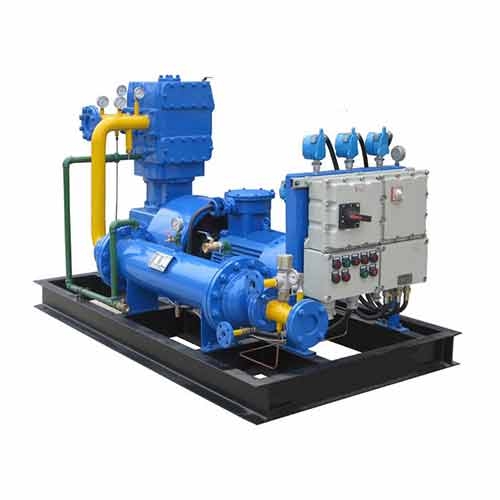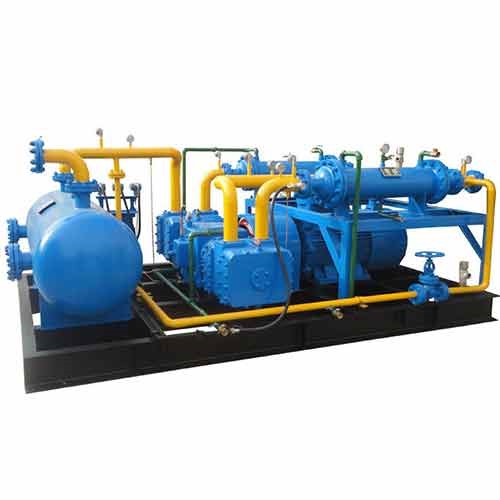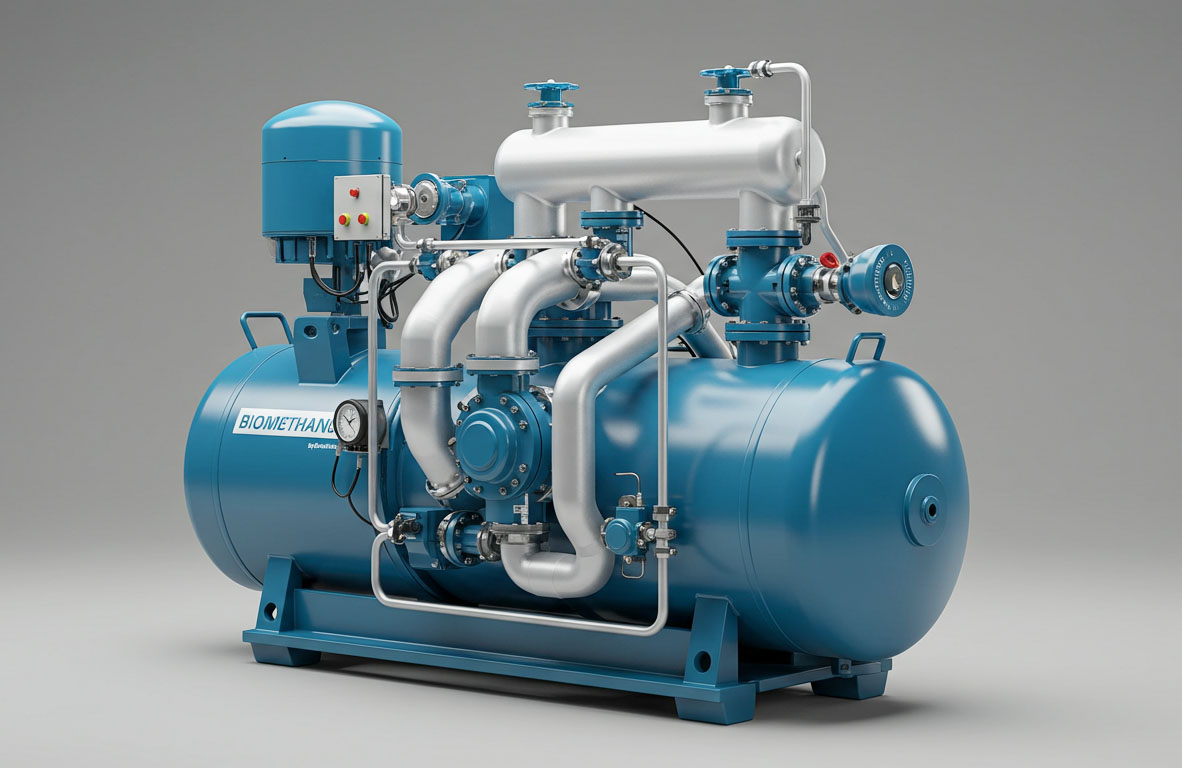Efficient Ethylene Compression: Enhancing Industrial Processes
An Ethylene Compressor is a precision-engineered machine crafted to elevate the pressure of ethylene gas, an essential element in a wide array of industrial applications. The compression of ethylene is instrumental in optimizing the effective management and utilization of this gas, exerting a profound influence on industries spanning petrochemicals, plastics, and refrigeration.
Understanding Ethylene Gas
What is Ethylene?
Ethylene, chemically represented as C2H4, is a colorless, flammable gas with a sweet odor. It is a hydrocarbon molecule composed of two carbon atoms and four hydrogen atoms. Ethylene is a naturally occurring plant hormone, but it is also produced industrially through processes such as steam cracking of hydrocarbons.
Industrial Applications of Ethylene
- Petrochemical Industry: Ethylene serves as a fundamental building block for the production of plastics, synthetic rubbers, and various chemical compounds.
- Food and Beverage Industry: It is employed to ripen fruits, particularly bananas and tomatoes, during transportation and storage.
- Agriculture: Ethylene is used to stimulate the flowering and fruiting of certain crops.
- Refrigeration and HVAC Systems: It is used as a refrigerant in some systems due to its low boiling point.
Importance of Ethylene Compression in Handling Ethylene Gas
- Safety: Compressing ethylene reduces the risk of leaks and ensures its safe containment.
- Transportation: Compressed ethylene is easier to transport in pipelines or cylinders.
- Processing Efficiency: Higher-pressure ethylene is essential for many chemical reactions and industrial processes.
- Storage: Compressed ethylene can be stored in a more space-efficient manner.
The Role of an Ethylene Compressor
Introduction to Compressors
Compressors serve as mechanical instruments with the primary purpose of elevating the pressure of gases or fluids by diminishing their volume. When applied to ethylene gas, an Ethylene Compressor emerges as a meticulously engineered apparatus specialized in the compression of ethylene.
Functioning of Ethylene Compressors
Ethylene Compressors execute their function by initially drawing in ethylene gas at a relatively modest pressure and subsequently subjecting it to mechanical compression, elevating its pressure level. This compression process unfolds through a meticulously choreographed interplay of components and procedural steps.

Vital Components of an Ethylene Compressor
- Inlet and Outlet Sections: The inlet segment serves as the entry point for ethylene gas into the compressor, while the outlet section facilitates the departure of the compressed gas. Both these segments hold a pivotal role in managing the flow and ensuring the precise execution of compression.
- Compression Chamber: The epicenter of the Ethylene Compressor, this chamber orchestrates the transformation of ethylene gas. Within, mechanical forces are applied to shrink its volume and escalate its pressure. This transformative process is typically executed using pistons, screws, or other compression mechanisms.
- Cooling System: Given that ethylene gas compression induces heat, an integral cooling system is imperative to avert overheating. Cooling strategies can encompass air or liquid-based mechanisms, maintaining the compressor’s temperature within secure limits.
- Control Mechanisms: Ethylene Compressors come equipped with control systems designed to govern the compression process. These mechanisms vigilantly oversee variables such as pressure, temperature, and flow rate to ensure the operation’s efficiency and safety.
Applications of Ethylene Compression
Petrochemical Industry
Ethylene compressor stands as the cornerstone of the petrochemical sector. Its primary role lies in the conversion of ethylene gas into a diverse array of indispensable products, including polyethylene, ethylene glycol, and a spectrum of chemical intermediates. These foundational materials, in turn, form the bedrock for a wide-ranging assortment of consumer goods, plastics, and industrial components.
Food and Beverage Industry
Within the food and beverage domain, ethylene compression assumes a distinctive function by facilitating the controlled ripening of fruits. Ethylene gas is harnessed to expedite the ripening process, ensuring that fruits like bananas and tomatoes attain peak ripeness while in transit and storage. This not only enhances quality but also reduces food wastage.
Plastics Manufacturing
The plastics manufacturing sector heavily relies on ethylene compression to craft various plastic varieties, including polyethylene and PVC. These versatile materials find applications in packaging, construction, automotive components, and an array of other products that contribute to the contemporary fabric of daily life.
Refrigeration and HVAC Systems
Ethylene’s role extends to acting as a refrigerant in select refrigeration and HVAC (Heating, Ventilation, and Air Conditioning) systems. The compressed form of ethylene assumes a pivotal position within these systems, aiding in precise temperature regulation and ensuring the efficiency of cooling processes in both commercial and industrial environments.
Benefits of Employing Ethylene Compressors
Improved Efficiency
Ethylene compressors optimize industrial processes by meticulously regulating ethylene gas pressure. This heightened efficiency accelerates production rates, curtails energy squandering, and augments the overall operational efficacy across diverse applications.
Enhanced Safety
Ethylene compression serves as a safeguard against the hazards posed by handling flammable gas. Compression diminishes the likelihood of leaks and accidents, fostering a secure work environment while diminishing potential perils.
Environmental Responsibility
Ethylene compressors are purposefully engineered to align with environmental directives and standards. They facilitate emissions reduction and promote the responsible management of ethylene, in harmony with sustainability objectives, thereby lessening the ecological impact of industrial endeavors.
Economical Advantages
Proficient ethylene compression translates into tangible cost savings. Through optimized utilization of ethylene gas, industries pare down resource consumption, slash energy expenditures, and minimize product wastage, culminating in substantial financial gains.
Types of Ethylene Compressors
Piston Compressors
These compressors use reciprocating pistons to compress ethylene gas. They are commonly used for moderate to high-pressure applications and are known for their reliability and efficiency.
Membrane Compressors
Membrane compressors utilize a flexible membrane to separate and compress gases. They are ideal for applications requiring high gas purity and are often chosen when maintaining the integrity of ethylene is crucial, such as in the petrochemical and semiconductor industries.
Selection Criteria for Ethylene Compressors
The judicious selection of an ethylene compressor hinges on factors such as pressure prerequisites, flow rates, adherence to safety protocols, and compliance with environmental regulations. These considerations guarantee optimal functionality and alignment with industry requisites.
CONCLUSION
In conclusion, an efficient ethylene compressor stands as a cornerstone in enhancing industrial processes. It not only boosts productivity and safety but also aligns with environmental sustainability goals and yields significant cost savings. Ethylene compressors, with their precise control and diverse applications, underscore their indispensable role in shaping a more efficient and responsible industrial landscape.


